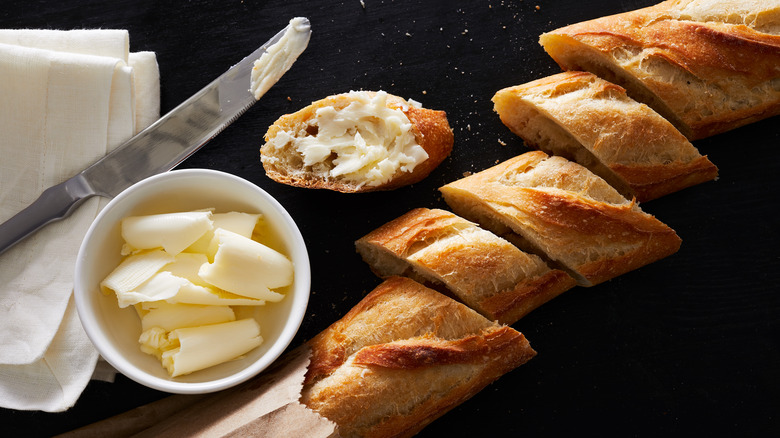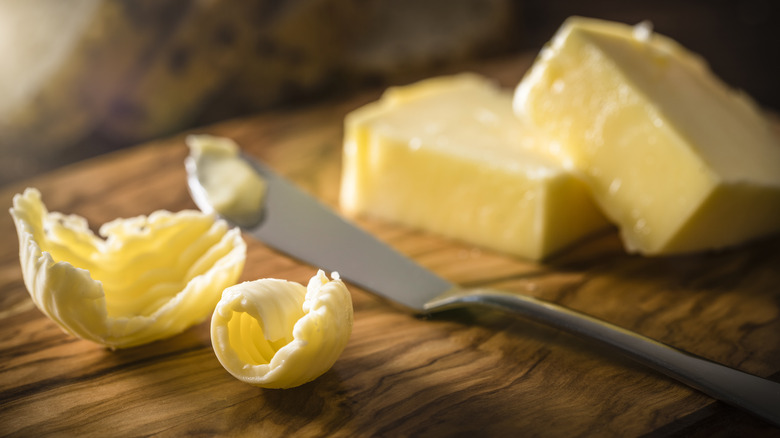Who Has The Cheaper Butter: Aldi Or Trader Joe's?
On the surface, there is little in common between supermarket chains Aldi and Trader Joe's aside from selling groceries. Taking wildly different approaches to leading consumers to great savings, the stores are most different when it comes to aesthetics. Aldi is about as stripped down as you can get. The store only offers around 2,000 core products and excels in offering generic brands of more expensive fare, which appeals to those looking to save some money. Trader Joe's also has brands specific to its store but has a more colorful staff, with employees dressed in Hawaiian shirts. Both stores have received a fascinating cult following in the food world, however, and the real test between a grocery store cage match is which offers kitchen staples on the cheap.
Butter, for instance, is a necessity for cooks and lovers of flavor. Keeping costs low is important to shoppers when it comes to that weekly shopping bill. For the best value, consumers will want to head over to the bell-ringing associates at Trader Joe's. Currently, 1 lb. of their unsalted butter goes for $3.99 while Aldi's similar brand is slightly more expensive for $4.09. But price aside, there may be other things food lovers will want to take into account when comparing stores.
How does the butter compare?
As much as price matters, the quality of the product is just as significant. When there is only a difference of 10 cents between butter selections, it should benefit the shopper to know which product is better. As advertised on their site, Trader Joe's celebrates the taste and consistency of their butter.
As the site states, Trader Joe's butter is "made from pasteurized, Grade AA cream—the highest grade available!— from cows that have never been given rBST hormones. The pale yellow cream is well-churned, ensuring luxurious, full-flavored Butter [sic]." For those health-conscious and interested in sustainability, this claim may factor into their decision.
RbST refers to the human growth hormone that cows are often supplied. According to The Aggie Transcript, experts consider the hormone harmful to the health of humans. The US Department of Agriculture also puts weight on the grades it gives butter. Grade AA is flavorful with low acidic content. Aldi's butter does not offer a grade on its website, but it should be noted that its unsalted brand is not the most popular the store has to offer. Irish butter has risen in popularity, and consumers swear by Kerrygold brand butter. While Countryside Creamery butter is a cheaper version of Kerrygold available at the chain, it seems to be the preferred option when buying at Aldi (and still costs $4.09 per pound). If you want a bargain as well as quality, Trader Joe's seems to be the best deal.
The prices of butter are comparable
Even with all this information in mind, the decision of which butter is the better deal is ultimately up to the shopper. Cooks in the kitchen may find the Trader Joe's product more appealing due to taste and industry standards. Aldi has many butter options, which could impact the consumer's decision as well. The two products in question are so close in price, that you can't really make a bad choice. These close comparisons may have something to do with the connection between Aldi and Trader Joe's. The two companies are closer than you might imagine.
According to Forbes, Aldi North bought Trader Joe's in 1979 and has belonged to the Albrecht family ever since. This relation may account for the reason why the supermarkets are so endearing to shoppers. Whether you like the hunt for deals at Aldi or enjoy Trader Joe's appealing customer service, each store has something for everyone. After decades of service, both chains have retained their respective identities, all while serving up hot, hot deals.


